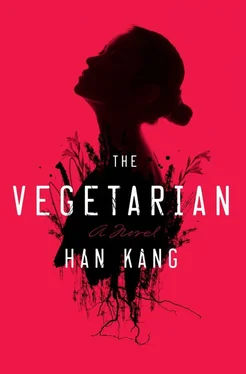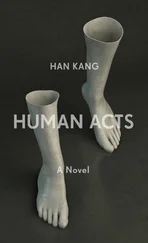The rain had gradually grown heavier as the afternoon wore on. This was March, so when darkness fell it did so very swiftly. It was extremely lucky that one of the nurses, who between them had fanned out and searched every inch of the neighboring mountain, did manage to find Yeong-hye; no, in fact it was nothing short of a miracle. That was what the doctor had said. Apparently this nurse had stumbled upon Yeong-hye in an isolated spot deep in the woods covering the mountain slope, standing there stock-still and soaked with rain as if she herself were one of the glistening trees.
When she’d got the call saying Yeong-hye had disappeared, which came around four in the afternoon, she’d been with her son, Ji-woo, who was six years old. The boy had been running a temperature for several days at that point, and she’d taken him to have his lungs X-rayed. He was standing alone in front of the machine, glancing back and forth between her and the doctor, apprehensive.
“Ms. Kim In-hye?”
“Speaking.”
“I’m Kim Yeong-hye’s nurse.”
This was the first time since Yeong-hye had been admitted that someone from the hospital had contacted her on her mobile. She herself called them only rarely, to check visiting times or occasionally to ask her sister whether everything was okay. In a composed tone of voice designed to conceal the urgency of the situation, the nurse informed her that Yeong-hye was missing.
“We’re doing all we can to find her, but if by chance she turns up at your home, you have to call us right away.” Before she hung up the nurse asked, “Is there anywhere else she might possibly have gone? Perhaps to your parents?”
“They live out in the countryside…I can contact them if you need me to.” She flipped the phone closed and put it in her bag, went into the X-ray room and hugged Ji-woo. He’d lost weight over the past few days, and his body felt light and hot in her arms.
“I did really well, Mum.” Perhaps it was just because of the fever, but his face seemed flushed with the expectation of praise.
“That’s right, he really didn’t move a muscle.”
After the doctor told her she didn’t think it was pneumonia she hugged Ji-woo again, bundled him into a taxi and was driven home in the rain. She hurriedly washed him, gave him rice porridge and medicine, and put him to bed early. There was no room in her thoughts for her missing sister. She hadn’t been able to sleep properly for the five days her son had been ill. And that night, if the fever didn’t abate, she would have to take him to be admitted to the general hospital. She was packing Ji-woo’s clothes and making sure she had his medical insurance certificate, just in case the need did arise, when the phone rang again. This had been sometime around nine in the evening.
“We’ve found her.”
“Thank goodness. I’ll come and visit next week as normal.” Her thanks were sincere, but subdued by fatigue. Only after she had hung up did it occur to her that the rain she had seen all day must have been pouring down on the mountain where Yeong-hye had been found too. An indiscriminate connection, their existences briefly aligned.
There was no way for her to judge the accuracy of the scene she saw then in her mind’s eye but had never seen in reality. She’d held a wet flannel to her snuffling son’s forehead all night, slipping occasionally into a sleep that was more like fainting, and saw a tree flickering in the rain like the spirit of some dead person. Black rain, black woods, the pale patient’s uniform, soaked through. Wet hair. Black mountain slope. Yeong-hye, an inchoate mass formed of darkness and water, standing tall like a ghost. Eventually the day dawned, and when she placed the palm of her hand on her son’s forehead she was relieved by the coolness she felt there. She got up, went out of the bedroom and stared blankly at the bluish half-light leaching in from the living room veranda.
She curled up on the sofa and tried to sleep. She had to get some sleep before Ji-woo woke up, even if it was only an hour.
Look, sister, I’m doing a handstand; leaves are growing out of my body, roots are sprouting out of my hands…they delve down into the earth. Endlessly, endlessly…yes, I spread my legs because I wanted flowers to bloom from my crotch; I spread them wide…
Yeong-hye’s voice, which came to her while she was suspended in that halfway state between sleep and wakefulness, was low and warm at first, then innocent like that of a young child, but the last part was mangled, inaudible, a distorted animal sound. Her eyes snapped open in fright, and she was stung by a waking hatred the likes of which she’d never felt before, before being thrown back into sleep. This time she was standing in front of the bathroom mirror. In the reflection, blood was trickling from her left eye. She quickly reached up to wipe the blood away, but somehow her reflection in the mirror didn’t move an inch, only stood there, blood running from a staring eye.
She swung herself up at the sound of Ji-woo’s coughing and went into the bedroom. Yeong-hye had sat there hunched in a corner of the room, a long time ago, but now she pushed that image from her mind and clasped her son’s small hand, lifting it up as if playing a game. “It’s okay now,” she muttered, but it wasn’t clear who these words were intended to comfort; the boy or herself.
—
The bus pulls over as it turns up the hill. She steps down and opens her umbrella. She is the only passenger alighting here. Without delay, the bus races off down the road.
The narrow road splits here. One road goes up over the hill. You pass through a tunnel, around fifty meters in length. When you emerge, the other side of the small hospital is visible, flanked by mountains on all sides. The rain is still pouring down, its measured cacophony slightly less vicious. She bends down. As she rolls up her trousers to keep them out of the wet, she notices the flaxleaf fleabane that has broken through the asphalt here and there. She adjusts her heavy bag, trying to ease her shoulders, puts up the umbrella and starts walking toward the hospital.
These days she goes every Wednesday to see how her sister is getting on, but before that rainy day when Yeong-hye went missing, once a month had seemed sufficient. She had walked this road carrying all manner of snacks — fruit, rice cakes, fried tofu stuffed with vinegared rice. It was desolate, with no sign of either vehicles or pedestrians. When she spread out the food on the table in the visiting room, Yeong-hye would silently go through the motions of chewing and swallowing, like a child diligently tackling homework. If she tucked Yeong-hye’s hair behind her ears, her sister would look up at her and smile quietly. These were the moments when there might have been nothing at all the matter, the moments that never failed to lighten her heart. Might it be okay, after all, for Yeong-hye to live like this indefinitely? Here, where she didn’t have to speak if she didn’t want to, didn’t have to eat meat if the thought repulsed her? Couldn’t the two of them get along just fine with these occasional visits?
Yeong-hye was four years younger than her, enough of an age gap for them not to have been in competition with each other growing up. As small children their young cheeks were frequently left throbbing by their heavy-handed father, and Yeong-hye had provoked in In-hye a sense of responsibility that resembled maternal affection, a need to expend all her energy in looking out for this younger sister. She had watched, marveling, as this same sister, once up to her elbows in the dirt and suffering from a recurring heat rash on the backs of her knees, grew up and got married. The one thing that caused her distress was that, as she got older, Yeong-hye became more and more taciturn. She’d always had this side to her, of course, but she had also been perfectly cheerful and sociable when the occasion called for it. Somehow — not suddenly, but over a period of time — she became difficult to read. So difficult that there were times when she seemed like a total stranger.
Читать дальше












